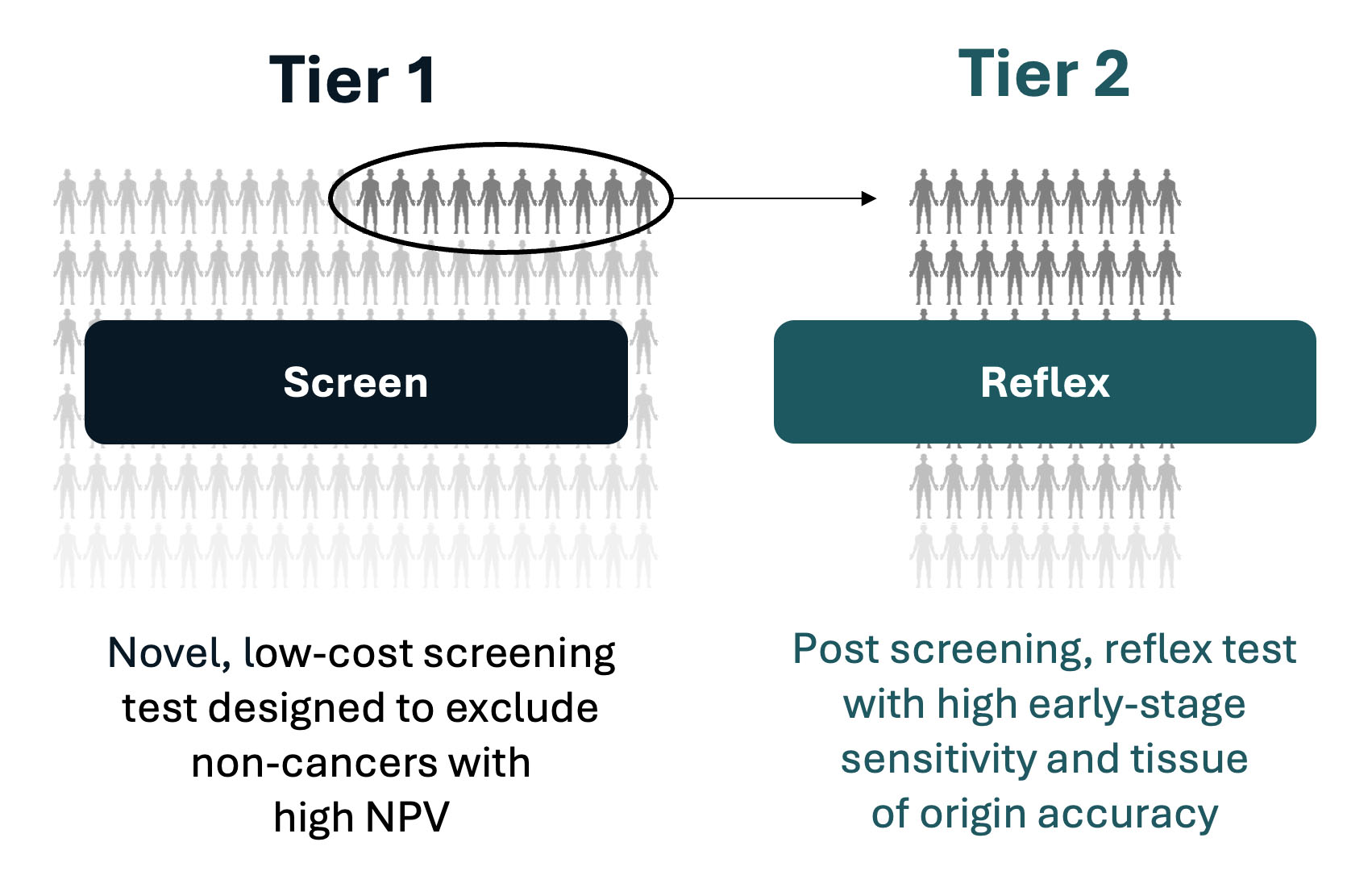“Reflexing” in The Right Direction: Two-Tier Testing for Early Cancer Screening
Harbinger’s goal for blood-based reflex cancer screening tests: the right test, for the right patient, at the right time
Two-tier, or reflex, testing is an established approach used in screening and diagnosis protocols for various infectious diseases and some autoimmune conditions, particularly in cases where balancing test sensitivity and specificity is crucial.
Mammography screening for breast cancer provides a good example of initial testing that may require additional testing in oncology to confirm the initial findings. If a radiologist identifies suspicious findings on a screening mammogram, they recommend the patient for additional diagnostic testing. This may include more specialized imaging (such as diagnostic mammography, ultrasound, or MRI) and potentially a biopsy if necessary.
This two-step approach allows for widespread initial screening with a relatively lower-cost test, followed by more precise and often more resource-intensive diagnostic procedures only for those with suspicious findings. This methodology aims to balance broad population screening with judicious use of more advanced diagnostic tools.
The presence of cancer is only confirmed after this more comprehensive diagnostic work-up. It’s important to note that while this paradigm is well-established for breast cancer screening, it is not universally applicable to all types of cancer detection and diagnosis.
At Harbinger Health, we are designing one of the first blood-based reflex tests for early cancer screening with the goal of making cancer screening affordable, accessible, and clinically informative with our two-tier model.

The first tier in our platform, or primary test, is a highly sensitive, low-cost, population level screening test that will confirm the absence of a cancer signal. This initial test is intended to rule out the presence of a cancer signal for most of the individuals that receive it. A small subset of people that take the Tier I test however, will receive results that indicate a confirmatory Tier II, or reflex test is needed. This reflex test will verify if a cancer signal is present and localize it. Together, these proprietary tests analyze specific regions of cancer’s DNA and use computational models to achieve target clinical performance and optimize the accuracy of test results.
The Tier I primary test is designed to be simple and affordable for large numbers of people to access, enabling more of the population to visit a care provider in their area to take the test, which can accurately rule out the presence of cancer. This makes possible a key benefit of the two-tier model: increased accessibility across care settings, particularly in underserved or rural areas where access to advanced laboratory facilities is limited.
By maximizing the negative predictive value (NPV) of the Tier I test, a negative test result indicates with high confidence that the person does not have cancer. With a high NPV, patients and providers can trust a negative result, thus reducing the need for more invasive and expensive follow-up procedures – ultimately sparing patients from unnecessary anxiety and driving costs out of the healthcare system.
The Tier II reflex test– much like an ultrasound as the next step following a mammogram – is designed to maximize positive predictive value (PPV). With high specificity and PPV, a positive result on the Tier II test represents a high likelihood that cancer is present and more accurately points to tissue of origin. This strategic design allows the two-tier testing model to reduce false positives, ensuring that individuals who test positive on both tests can, together with their provider, move forward to the best treatment plan, and avoid unnecessary tests or interventions.
At Harbinger Health, we are designing our two-tier testing model to control costs and deliver significant clinical value, by providing reliable early detection for those at risk, and clear actionable results for all patients. We hope this approach will maximize our ability to accurately detect cancer at the earliest possible stages, reserve medical resources for those most likely to have cancer, and – most critically – prioritizes those in need. We deeply believe that our innovative testing solution will revolutionize cancer screening, overcoming many of the most significant challenges in the field today.
—
Stay in the loop on all of the exciting news, innovations, and developments from Harbinger Health. Sign up for updates in our e-newsletter.
